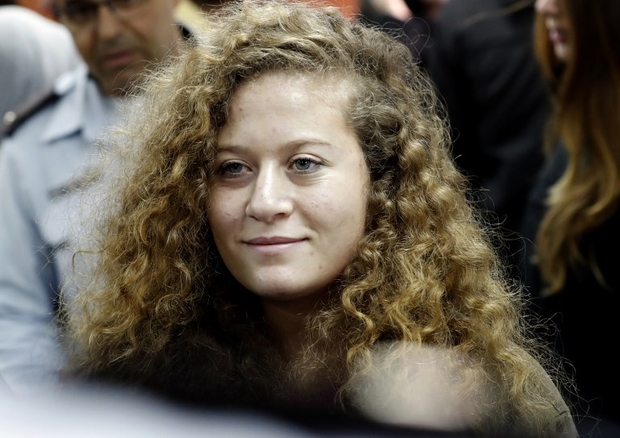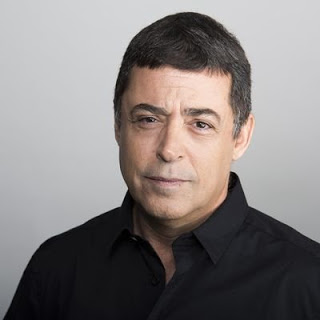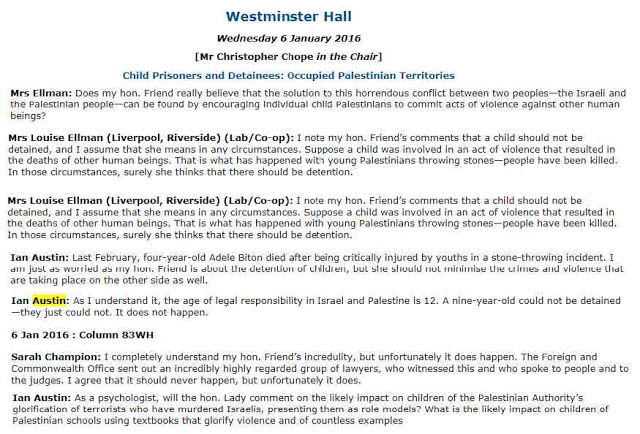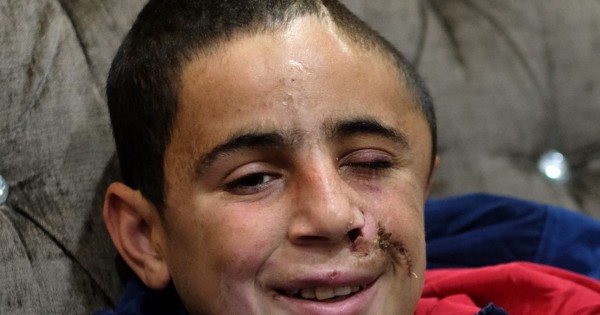Elor Azaria, who murdered an unconscious wounded
Palestinian is released also after 8 months
THIS IS ISRAELI JUSTICE
Ahed Tamimi was yesterday sentenced to 8 months imprisonment for slapping a soldier who entered the grounds of her house. Ahed Tamimi, who has become a heroine of the Palestinian resistance, was filmed slapping an Israeli soldier who entered the grounds of her house. She was perfectly entitled under International Law to resist a soldier from Israel’s Occupation. But of course under the military dictatorship that Palestinians live under Ahed was guilty since Israel pays no heed to international law.
As she was led away to begin her sentence she shouted ‘There is no Justice Under Occupation’. Even during her pre-trial hearings Ahed retained her sense of humour. Asked by the Military Judge how she hit the solder she said, ‘take off these handcuffs and I’ll show you.’ I have written extensively on this and you may wish to refer to my previous articles:
Jewish
Chronicle Hits a New Low – A Vile Article Attacking 16 year old Ahed Tamimi,
Ahed Tamimi’s arrest sheds a disturbing light on how
children are targeted by Israel,
Ahed
Tamimi’s lawyer: Her case is making people see the occupation again, Torture
couldn’t happen to a Jewish child – 16 year old Ahed Tamimi’s Detention is
Extended by Israel’s Military Court
video of Ahed standing up to the soldiers went viral, there were calls from the
racist Education Minister Naftali Bennett for her to ‘finish her life in prison’.
army kidnapped Ahed in the middle of the night, video photographer accompanying them, awakening her in her house in the
early hours of the morning and thus began a 3 month ordeal in which more
charges were added to the bill of indictment.
prosecuted in a Military Court which has a 99.74% conviction rate. In reality she is being tried by the same
army that has arrested and brutalised her.
Unlike Israeli children she has no protection, access to parents, social
workers etc. She is, like in Nazi Germany,
the untermenschen and is treated
accordingly.
She was subject
to what amounted to calls to rape and sexually assault her by prominent Ma’ariv journalist Ben
Caspit who wrote in Maariv:
“in the case of the girls, we should exact a price at some other opportunity, in the dark, without witnesses and cameras”
and Israel’s hasbara propaganda machine couldn’t keep up. Instead of a
Palestinian in traditional Arab garb with a headscarf, she was an engaging white
teenager with blonde hair and an endearing smile.
with.
now a government minister, Michael Oren couldn’t accept this. It was a ‘fake
family’ she was deliberately dressed by her parents in western
clothes. Apparently there had been an investigation into
the Tamimi family two years ago to establish if they were a real family!
 |
| As in South Africa under Apartheid or in the Deep South under Jim Crow the penalty for killing a Palestinian is always less than killing the herrenvolk, a Jew |
ordeal dragged on even the Israeli army realised that Israel has suffered massive
PR damage. Their treatment of a young Palestinian
girl compared to what an Israeli child would experience is so obviously unjust
that you would have to be a particularly thick Zionist to not notice.
That is why Fadi Quoran’s article below is correct. Israel’s military prosecutors had originally intended to put Ahed away for years. They dug up false allegations from years ago but the scale of the international campaign has forced the bastards to back off. In the end holding Ahed was a liability they wanted to be shot of. All the weapons in the world were to no avail against a young girl’s courage.
We should treat this as a victory and Ahed herself as a hero. As a 17
year old girl under massive & enormous pressure she refused to answer any
questions or co-operate in any way. What a contrast between the Quisling of the Palestinian Authority
Mahmoud Abbas in Ramallah and Ahed Tamimi.
light on Israel’s Injustice System.
Hence the Israeli military judge decided, against the pleas of the
family, that she would be tried in secret as befits a police state. She and her parents were opposed to this
because they wanted the light of publicity to expose these racists.
The Military Court decided that the court hearing should be held in secret not for Ahed’s benefit but to save their own embarrassment. The army were happy to video her arrest as a way of asuaging the racist Right in Israel but they didn’t want the publicity that came with her continued detention.
Of course if a closed trial had really been for her benefit then she would never have been incarcerated in the first place, still less held in pre-trial detention. The lies just keep pouring off the Zionist PR machine.
Israel, like all settler states, is essentially stupid. The cries for revenge against Ahed resounded in Israel but people abroad could not understand the Biblical vengeance being exacted against a female David. It was as if the story of David and the slingshot was being reversed with Goliath demanding his pound of flesh.
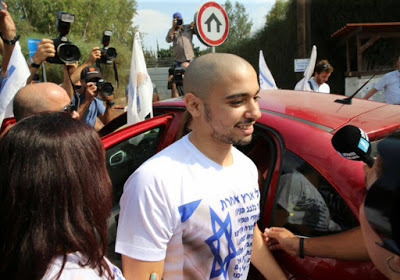 |
| Racist murderer Elor Azaria receives the same sentence as Ahed – Palestinian life is cheap |
case with Israeli murderer Elor Azaria.
He shot a severely wounded Palestinian in the head whilst he was on the
ground. This supporter of the Jewish Nazi
Kach movement was sentenced to 18 months imprisonment, which was reduced twice
and he was eventually let out after serving little over 8 months. In other words the same sentence as Ahed who
is unlikely to have her sentence cut.
You can be sure that this murderous psychopath, who was a hero before he went into prison, was treated like a hero when he was inside. Ahed’s treatment by all accounts will be nasty and violent and it is a tribute to her and the hundreds of Palestinian children that they bear it with fortitude.
Labour MPs Louise Ellman and Ian Austin Who Support Israeli Child Abuse Should be Expelled
A month ago I was expelled from the Labour Party because I called the execrable Blairite MP Louise Ellman a supporter of Israeli child abuse. The idiot of a barrister, Thomas Ogg, said that I was shaming her. Indeed I was and I intend to continue doing so.
To be fair to Ellman and I always try to be fair (!) she was joined by another Labour MP who should go, the detestable right-winger Ian Austin MP, the man who heckled Jeremy Corbyn in the debate on the Chilcott Report. Let us hope that his CLP gets rid of him.
Below is a graphic of the contributions of these two supporters of Palestinian child abuse
this is an extremely important case. The issue of Israel’s child
prisoners should be highlighted continuously.
|
In
Israeli military courts, Palestinian minors always lose
Israeli civilian courts, detention is always a last resort for a minor. But
when it comes to Palestinian minors in Israeli military courts, prison is
almost guaranteed.
Yael Marom
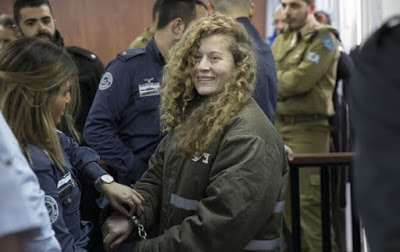 |
| Ahed Tamimi in the Ofer prison military court. December 20, 2017. (Oren Ziv/Activestills) |
have dedicated significant effort in recent years to highlighting the
improvements allegedly made in the treatment of Palestinian minors within
Israeli military courts in the West Bank.
achievements are the establishment a juvenile court in the military court
system, allowing for the increased involvement of parents in the military
justice system, decreasing the length of time a child can be detained before
being brought before a judge, and even an abandoned experiment of issuing summonses
to Palestinian minors instead of sending an invading force of soldiers to
arrest them in their homes in the middle of the night — the common practice
today.
Israeli human rights group B’Tselem on Tuesday argues that these so-called
improvements have improved very little. The juvenile military court system
system, which uses the tactic of denying bail to pressure over 70 percent of
juvenile defendants and their families into accepting plea bargains, has a
startling conviction rate that exceeds 95 percent.
courts do not come close to conforming to international standards and
conventions signed and implemented by Israel, according to the B’Tselem report.
And Israel’s treatment of Palestinian minors contrasts starkly with the treatment Israeli
children receive in Israel’s separate, civilian juvenile justice system.
prosecuted 1,046 Palestinian minors in 2014 and 2015, according to the
Association for Civil Rights in Israel. More than a quarter of those
indictments were of children 15 and under. Already in the first two months of
2018, the army arrested 274 Palestinian minors who were thrust into the
military court system, according to Palestinian human rights group
Addameer.
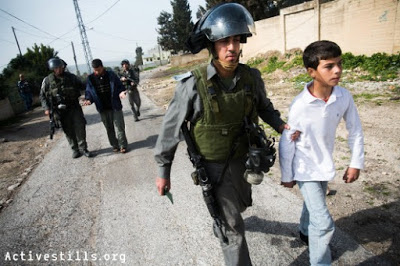 |
| Israeli soldiers arrest a Palestinian youth during a protest against Donald Trump’s recognition of Jerusalem as Israel’s capital, Hebron, West Bank, December 7, 2017. (Wisam Hashlamoun/Flash90) |
disturbing differences between the Israeli civilian and military juvenile
justice systems is that in the Israeli system, arrest and pre-conviction
detention is supposed to be a last resort; other options are to be exhausted
before resorting to imprisonment. In the military system, to which Palestinian
children are subjected, pre-conviction detention (denying bail) is
the rule; there are virtually no alternatives to detention, and exceptions are
extremely rare.
that Palestinian minor defendants are faced with the following choice: fight
the charges and remain in prison for the duration of their trial or sign a plea
deal and get a reduced sentence. Considering the time spent in prison awaiting
trial, however, even defendants likely to be acquitted still might spend more
time behind bars than if they had just signed a plea deal.
testimonies collected by B’Tselem and published in the new report describes
what the system looks like from the perspective of a Palestinian teenager:
15-year-old from the Jalazun refugee camp near
Ramallah, was arrested last August. Soldiers broke into his house at 3:00 a.m.
without explaining why. He was handcuffed and blindfolded. According to Abed’s
testimony, soldiers beat and cursed him during the drive from his home to the
military base. He was detained for several hours overnight at the base,
handcuffed and tied to a wooden post outside, forbidden from going to the
bathroom. The soldiers took him to a police station in the morning. In the
interrogation room, he was questioned about stone-throwing and a pipe bomb. The
interrogator permitted him to call his parents but not a lawyer. The
interrogator never explained Abed’s rights to him, particularly his right to
remain silent.
interrogation, the interrogator pressured Abed to confess to the crimes of
which he was accused, saying that it would help him. Abed refused. The
interrogator wanted Abed to sign two documents in Hebrew, which Abed did not
understand and refused to sign. Abed was then moved to the cell for
minors at Ofer Prison,
and then to the military court there. The entire ordeal was less than 12 hours
— but 12 hours during which he was completely alone. There was no one waiting
for him in court either — neither his parents nor a lawyer. Abed said he did
not know what the purpose of the hearing was, and when the hearing was over, he
was sent back to prison.
was brought back to court. A lawyer told him he wanted to sign a deal that would
include a sentence of two-and-a-half months — exactly the amount of time Abed
had already spent in prison. And so it was. Abed’s parents paid a fine of NIS
2,000, and Abed received another five months of probation. At 7:00 p.m. that
night, Abed was informed that he was being released. His brother was waiting
for him outside of the prison, but the Israeli authorities instead released him
at the Ben Sira checkpoint, where no one waiting. Abed said he used a waiting
cab driver’s phone to call his brother, who came and took him home.
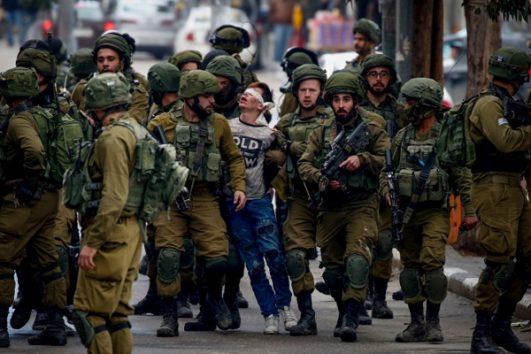 |
| Israeli soldiers arrest a child during the weekly demonstration in Kfer Qaddum, a West bank village located east of Qalqiliya, on January 25, 2013. |
improvements Israel has made? B’Tselem addresses them one by one.
require bringing minors before a judge sooner actually change the length of
time they spend in pre-conviction detention? First of all, remand and bail
hearings are not held in the new juvenile military court, so considerations of
the child’s wellbeing are rarely raised — the use of detention as a first
resort, as opposed to a last resort, has not changed. Secondly, seeing a judge
sooner and more frequently has not led to any discernible reduction in the
amount of time spent in detention or the ease with which the courts deny bail,
according to the report.
allowing a greater role for defendants’ parents in the juvenile military court
system lead to an improvement in advocacy for the child and their best
interests? According to B’Tselem, however, the change is almost entirely
symbolic, and parental involvement remains minimal. Parents do not have the
right to be present during their children’s interrogation, nor does the army
actually update parents on the details of their child’s detention.
is that none of the changes have affected the way Palestinian juveniles are
arrested, interrogated, and remanded to custody without bail. As long as the
system is designed to churn out
confessions that lead to plea deals — and the protections for
those earlier stages of custody remain unimplemented — reforms to the trial
system inside the new juvenile courts will remain virtually moot. Palestinian
children rarely stand trial and the merits and circumstances of their
confessions are never critically reviewed by a judge.
Marom is Just Vision’s public engagement manager in Israel and a co-editor of
Local Call, where a longer version of this article first appeared in
Hebrew. Read it here.
 |
| Ahed Tamimi, 17, became hero to Palestinians after 15 December incident outside her home (AFP) |
March 2018 0:33 UTC
slapping an Israeli soldier in the occupied West Bank, accepted a plea deal on
Wednesday under which she will be sentenced to eight months in prison, her
lawyer said.
outside her home in the village of Nabi Saleh was streamed live on Facebook by
her mother and went viral.
village against Israeli policy on settlements in the West Bank, one of the most
heated issues in the Israeli-Palestinian conflict.
she faced 12 charges, including aggravated assault.
shouted out to reporters at court in the Ofer military prison, near the West
Bank city of Ramallah.
court, Tamimi will plead guilty to a reduced charge sheet that includes assault
and would be sentenced to eight months in jail and pay a fine of 5,000 shekels
(about $1,430). The Israeli military confirmed the details of the deal.
community
since her arrest in December.
near their home. An Israeli watchtower stands at the entrance to the village
and there are often soldiers in the area. Her mother, Nariman, and a cousin
were also arrested. Both have accepted plea bargains, a family lawyer said.
they are shaken, because they saw their children in front of them. It broke the
stereotyped image of the Palestinian in the international community,”
Tamimi’s father, Bassem Tamimi told Reuters.
Israelis, who debated whether the officer should have hit back. The army said
the soldier “acted professionally” by showing restraint but right-wing
politicians described his behavior as humiliating.
Culture Minister Miri Regev said on her Facebook page after the incident.
“We cannot have a situation in which soldiers are humiliated and hit and
they do not act at that moment and arrest those who hurt them.”
“will continue operating in order to preserve the security and public
order in (the West Bank) and enforce the law as it pertains to anyone who harms
(Israeli) soldiers and incites violence.”
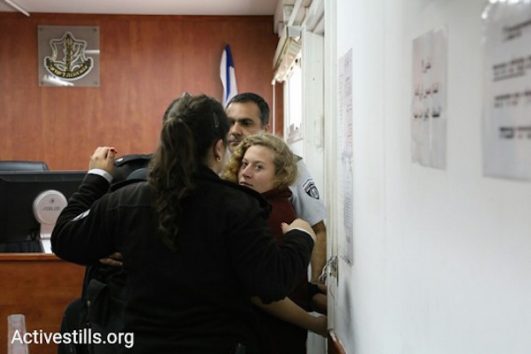 |
| Ahed in court |
military court in the West Bank.
minor, as is usual in such cases.
that we were not going to get a fair trial,”
Lasky told AFP in describing
her reasons for seeking a plea bargain.
Israeli authorities’ actions in the case, while the European Union has
expressed concern over Israel’s detention of minors, including Ahed Tamimi.
were not going to get a fair trial
child behind bars for eight months for calling for protests and slapping a
soldier, after threatening her with years in jail,”
Sarah Leah Whitson,
executive director of the Middle East division of Human Rights Watch, said in a
statement.
occurred in the yard of their home in Nabi Saleh, near Ramallah in the West
Bank.
Palestinians from throwing stones at Israeli motorists.
leave before shoving, kicking and slapping them.
Donald Trump’s controversial recognition of Jerusalem as Israel’s capital.
Jerusalem and the Gaza Strip. Most countries consider Israeli settlements built
on territory Israel captured in the 1967 Middle East war to be illegal.
should be determined in peace talks with the Palestinians. Negotiations
collapsed in 2014 and efforts by the White House to restart them have showed
little progress.
the “Rosa Parks of Palestine”, and the small courtroom was often
packed with journalists, diplomats and international observers during hearings.
Rosario Dawson and novelist Alice Walker, signed a petition calling for her
release and comparing her case to those of “the children of immigrants and
communities of color who face police brutality in the United States”.
Three reasons why Israel backed down, and Ahed Tamimi will walk free
The
Israeli military was forced to give in and drop 8 of the charges
against Ahed as part of a plea bargain, in which Ahed recognized in
court the fact that she slapped the soldier and called for protests. In
return, Ahed will get the minimum sentence of 8 months instead of
spending at least 3 years in prison
based on what the military prosecutor was initially seeking. Lawyers at
Ofer Military Court told us we would be lucky if they offered a 2 year
plea bargain. But now, Ahed will be out in July — early enough to go to
her first year in college. For the next 4 months in prison, Ahed will
focus on her studies and take her final year exams. Ahed’s mother,
Nariman, will also be released at the same time.
fact that a child will be jailed for 8 months for slapping a soldier
whose troops just shot her 15 year old cousin in the face is extreme,
but in the context of the 99% conviction rate in the Israeli military
court system and right-wing incitement against Ahed, this compromise by
the Israeli military shows they have decided to back down in the face of
growing pressure to release Ahed. In fact, they were begging Ahed’s
lawyer, Gaby Lasky, to accept the plea bargain.
subjected Ahed Tamimi to intense military interrogations led by a
member of Israel’s military intelligence. The interrogation tactics were
meant to coerce her into admitting guilt on the 12 charges brought
against her. Detained
children, who are often beaten, disoriented, and afraid, end up saying
anything the interrogator wants them to — but Ahed courageously
maintained her right to remain silent throughout the entire
interrogation.
to break Ahed, the Israeli military arrested 10 other Palestinians from
Nabi Saleh, 8 of them children. These children also remained steadfast
and refused to allow the military to coerce them into giving false
testimony to indict Ahed.
Ahed’s case created massive global uproar from citizens to diplomats:
millions around the world watched in shock as a 16 year old girl was
terrorized, and Israel failed to spin the story.
a massive right-wing Israeli campaign calling for the arrest, and
sometimes even murder, of Ahed, which was followed by her arrest, Ahed quickly became a symbol of Palestinian children.
an effort to spin the story in Israel’s favor, former Israeli
Ambassador to the United States, Michael Oren, claimed that the ‘Tamimi
family were actors’, which journalists did not buy. Oren further claimed
that the Knesset had a committee investigating the “authenticity” of
the family, which was quietly ridiculed in diplomatic circles as a sign
of Israel’s paranoia and its inability to humanize Palestinians.
a last ditch effort to defame the Tamimi family, 15 year old Mohammad
Tamimi, whose skull was shattered when a soldier shot him in his face,
was arrested. Ahed slapped the soldier because she heard her cousin
Mohammad was shot and in critical condition — and that story intensified
global support for her case. The Israeli military interrogated Mohammad
and successfully coerced him into saying he got his head injury (a
third of his skull was missing and he needed surgery to replace it) from
falling off of a bicycle. Major General Yoav Mordecai posted Mohammad’s
“confession” on his Facebook page. However, the Tamimi family quickly
released x-rays, footage, and hospital records that proved without a
doubt that Mohammad was shot, forcing the military to retract.
Tamimi — skull shattered by a bullet fired from an Israeli soldier
during protests in Nabi Saleh. His injury led Ahed to confront, and
slap, the soldiers firing at kids from her home’s front porch.
many nations that were already worried about the ill-treatment of
Palestinian children in Israeli military prisons spoke up. The EU said it was “deeply concerned”
about the arrest of minors. Diplomats from around the world were
mobilised to watch Ahed’s hearing, with representatives from Germany,
France, Belgium, Spain, and many others attending her trial.
Israeli military hoped that the arrest of Ahed would deter the youth of
Nabi Saleh (Ahed’s village) and Palestinians across the region from
protesting. What happened was the opposite: The youth were inspired by
Ahed’s agency, and protests in Nabi Saleh and elsewhere became larger
and more intense.
from the villages around Nabi Saleh also joined its protests. And
Palestinian students began the process of organising a
#March_for_our_freedom. Fearing further upheaval, and unwilling to make
Ahed a bigger hero, the Israeli military was forced to give in and drop 8
of the charges against Ahed. Instead of spending over 3 years in prison
based on what they had initially pursued, she will now be out in
July — early enough to go to her first year in college. The only thing
she was booked for were the things in the video — slapping a soldier and
calling for protests. They dropped the charge of inciting to bombings
and stabbings for her and her mother, and the charge of stone throwing.
For the next 4 months in prison, Ahed will focus on her studies and take
her final year exam.
is essential that we tell Ahed’s story as it is, one of steadfastness
in prison and a failure by the military to break her. In court, Ahed
said: “There is no justice under occupation.” She’s right, and that’s
why this plea deal, as unfair as it is, was the best she could hope for
and the biggest possible compromise the Israeli military, under
pressure, could give. There are 356 children, all like Ahed, still in
military confinement. Every year over 750 children are arrested. Let’s
continue to take action until they are all free.
